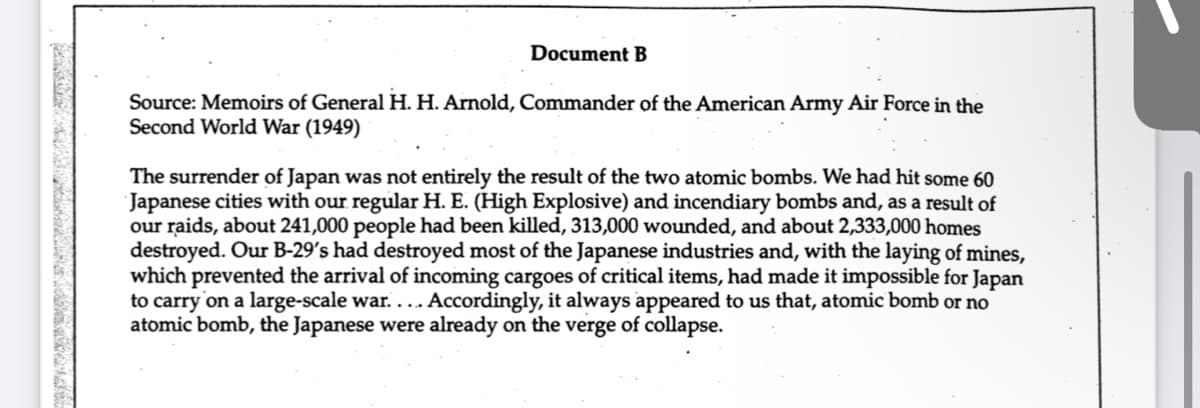Document B Source: Memoirs of General H. H. Arnold, Commander of the American Army Air Force in the Second World War (1949) The surrender of Japan was not entirely the result of the two atomic bombs. We had hit some 60 Japanese cities with our regular H. E. (High Explosive) and incendiary bombs and, as a result of our raids, about 241,000 people had been killed, 313,000 wounded, and about 2,333,000 homes destroyed. Our B-29's had destroyed most of the Japanese industries and, with the laying of mines, which prevented the arrival of incoming cargoes of critical items, had made it impossible for Japan to carry on a large-scale war. ... Accordingly, it always appeared to us that, atomic bomb or no atomic bomb, the Japanese were already on the verge of collapse.
Document B Source: Memoirs of General H. H. Arnold, Commander of the American Army Air Force in the Second World War (1949) The surrender of Japan was not entirely the result of the two atomic bombs. We had hit some 60 Japanese cities with our regular H. E. (High Explosive) and incendiary bombs and, as a result of our raids, about 241,000 people had been killed, 313,000 wounded, and about 2,333,000 homes destroyed. Our B-29's had destroyed most of the Japanese industries and, with the laying of mines, which prevented the arrival of incoming cargoes of critical items, had made it impossible for Japan to carry on a large-scale war. ... Accordingly, it always appeared to us that, atomic bomb or no atomic bomb, the Japanese were already on the verge of collapse.
Related questions
Question
Explain this document

Transcribed Image Text:Document B
Source: Memoirs of General H. H. Arnold, Commander of the American Army Air Force in the
Second World War (1949)
The surrender of Japan was not entirely the result of the two atomic bombs. We had hit some 60
Japanese cities with our regular H. E. (High Explosive) and incendiary bombs and, as a result of
our raids, about 241,000 people had been killed, 313,000 wounded, and about 2,333,000 homes
destroyed. Our B-29's had destroyed most of the Japanese industries and, with the laying of mines,
which prevented the arrival of incoming cargoes of critical items, had made it impossible for Japan
to carry on a large-scale war..... Accordingly, it always appeared to us that, atomic bomb or no
atomic bomb, the Japanese were already on the verge of collapse.
Expert Solution
This question has been solved!
Explore an expertly crafted, step-by-step solution for a thorough understanding of key concepts.
This is a popular solution!
Trending now
This is a popular solution!
Step by step
Solved in 2 steps
